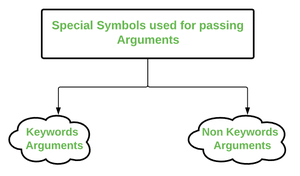Understanding *args and **kwargs in Python
This article explains how to use *args and **kwargs in Python to pass a variable number of arguments to functions.
This article explains how to use *args and **kwargs in Python to pass a variable number of arguments to functions.
In Python, you can use special syntax in function definitions to handle a flexible number of arguments. Let's explore how *args and **kwargs provide this flexibility.
In Python, *args and **kwargs are special syntaxes used in function definitions to allow the function to accept a variable number of arguments.
*args
*args is treated as a tuple containing all the positional arguments passed to the function.*args to access individual arguments.Example:
def my_function(*args):
for arg in args:
print(arg)
my_function('Hello', 'World', 123)This code will print:
Hello
World
123
**kwargs
**kwargs is treated as a dictionary containing all the keyword arguments passed to the function.Example:
def my_function(**kwargs):
for key, value in kwargs.items():
print(f"{key}: {value}")
my_function(name='John', age=30, city='New York')This code will print:
name: John
age: 30
city: New York
Using *args and **kwargs Together
You can use both *args and **kwargs in the same function definition.
Example:
def my_function(*args, **kwargs):
print("Positional arguments:")
for arg in args:
print(arg)
print("\nKeyword arguments:")
for key, value in kwargs.items():
print(f"{key}: {value}")
my_function('Apple', 'Banana', name='John', age=30)This code will print:
Positional arguments:
Apple
Banana
Keyword arguments:
name: John
age: 30
Important Notes:
args and kwargs are conventions, you can use any valid variable name as long as you keep the asterisks (* and **).*args must come before **kwargs in the function definition.*args and **kwargs to unpack iterables and dictionaries, respectively, when calling a function.This Python code demonstrates how to use *args and **kwargs to pass a variable number of arguments to functions. It includes examples of defining functions with *args and **kwargs, accessing these arguments within the function, using both argument types in a single function, and unpacking iterables and dictionaries as function arguments.
# Example for *args
def print_arguments(*args):
"""Prints all the arguments passed to the function.
"""
print("Positional arguments:")
for arg in args:
print(arg)
print_arguments('Hello', 'World', 123)
# Example for **kwargs
def print_keyword_arguments(**kwargs):
"""Prints all the keyword arguments passed to the function.
"""
print("\nKeyword arguments:")
for key, value in kwargs.items():
print(f"{key}: {value}")
print_keyword_arguments(name='John', age=30, city='New York')
# Example for using *args and **kwargs together
def print_all_arguments(*args, **kwargs):
"""Prints both positional and keyword arguments.
"""
print("\nAll arguments:")
for arg in args:
print(arg)
for key, value in kwargs.items():
print(f"{key}: {value}")
print_all_arguments('Apple', 'Banana', name='John', age=30)
# Example for unpacking iterables and dictionaries
my_list = [1, 2, 3]
my_dict = {'a': 1, 'b': 2}
print_all_arguments(*my_list, **my_dict)This code demonstrates the usage of *args and **kwargs with clear explanations and examples. It covers:
*args and **kwargs.*args and **kwargs in the same function.* and ** when calling a function.Understanding the Mechanics:
* and ** operators are actually performing packing and unpacking of iterables (like lists, tuples) and dictionaries respectively.*args) or dictionary (**kwargs).Best Practices and Considerations:
*args and **kwargs is highly recommended for code clarity and common understanding among Python developers.Advanced Usage:
*args and **kwargs are frequently used in decorators to create generic wrappers that can modify the behavior of functions with different argument signatures.Beyond the Basics:
*args, **kwargs with type hinting in Python.| Feature | *args |
**kwargs |
|---|---|---|
| Purpose | Pass variable number of positional arguments | Pass variable number of keyword arguments |
| Syntax | *args |
**kwargs |
| Data Type Inside Function | Tuple | Dictionary |
| Accessing Arguments | Iterate over tuple | Access values by keys |
Key Points:
*args and **kwargs to create flexible functions that accept varying inputs.*args must always come before **kwargs in function definitions.*, **).*args and **kwargs to unpack iterables and dictionaries when calling functions.*args and **kwargs are powerful tools in Python that allow functions to accept a flexible number of arguments. *args handles positional arguments, while **kwargs manages keyword arguments. Understanding these concepts enhances code flexibility and reusability, making your Python programming more efficient and adaptable to various scenarios.
 *args and **kwargs in Python - GeeksforGeeks | A Computer Science portal for geeks. It contains well written, well thought and well explained computer science and programming articles, quizzes and practice/competitive programming/company interview Questions.
*args and **kwargs in Python - GeeksforGeeks | A Computer Science portal for geeks. It contains well written, well thought and well explained computer science and programming articles, quizzes and practice/competitive programming/company interview Questions. Python args and kwargs: Demystified – Real Python | In this step-by-step tutorial, you'll learn how to use args and kwargs in Python to add more flexibility to your functions. You'll also take a closer look at the single and double-asterisk unpacking operators, which you can use to unpack any iterable object in Python.
Python args and kwargs: Demystified – Real Python | In this step-by-step tutorial, you'll learn how to use args and kwargs in Python to add more flexibility to your functions. You'll also take a closer look at the single and double-asterisk unpacking operators, which you can use to unpack any iterable object in Python. How To Use *args and **kwargs in Python 3 | DigitalOcean | In this tutorial, we will cover the syntax of working with *args and **kwargs as parameters within functions to pass a variable number of arguments to a give…
How To Use *args and **kwargs in Python 3 | DigitalOcean | In this tutorial, we will cover the syntax of working with *args and **kwargs as parameters within functions to pass a variable number of arguments to a give… Python *args and **kwargs (With Examples) | We use *args and **kwargs as an argument when we are unsure about the number of arguments to pass in the functions.
Python *args and **kwargs (With Examples) | We use *args and **kwargs as an argument when we are unsure about the number of arguments to pass in the functions. Taking the argument signature from a different function - Typing ... | First let me make clear: I’m not writing a decorator. This is a real issue from my cattrs library. I have a class with a certain init signature. I have many functions, in different modules, essentially wrapping this init. These functions all take *args, **kwargs and use them to call this init. I want all of these functions to have the same input parameters as this init at type-checking time, and not *args: Any, **kwargs: Any. One solution is just to copy/paste the arguments and...
Taking the argument signature from a different function - Typing ... | First let me make clear: I’m not writing a decorator. This is a real issue from my cattrs library. I have a class with a certain init signature. I have many functions, in different modules, essentially wrapping this init. These functions all take *args, **kwargs and use them to call this init. I want all of these functions to have the same input parameters as this init at type-checking time, and not *args: Any, **kwargs: Any. One solution is just to copy/paste the arguments and... 1. *args and **kwargs — Python Tips 0.1 documentation | *args and **kwargs are mostly used in function definitions. *args and **kwargs allow you to pass an unspecified number of arguments to a function.
1. *args and **kwargs — Python Tips 0.1 documentation | *args and **kwargs are mostly used in function definitions. *args and **kwargs allow you to pass an unspecified number of arguments to a function. Typing generic callback protocol with *args and **kwargs - Python ... | I’m trying to do some possibly weird stuff with decorators and I’m struggling to get the typing right. I have created a decorator to which you provide some metadata, and when it’s called on a function it will put that function in a container with the associated metadata and then store that container with the same name as the original function. The functions that I store in the container are generic in their arguments and return types, and I cannot seem to get everything working together. Here...
Typing generic callback protocol with *args and **kwargs - Python ... | I’m trying to do some possibly weird stuff with decorators and I’m struggling to get the typing right. I have created a decorator to which you provide some metadata, and when it’s called on a function it will put that function in a container with the associated metadata and then store that container with the same name as the original function. The functions that I store in the container are generic in their arguments and return types, and I cannot seem to get everything working together. Here... Why do I have to use self = str.new(*args, **kwargs)? I tried not ... | Ewerton Luna is having issues with: class Reversed
Why do I have to use self = str.new(*args, **kwargs)? I tried not ... | Ewerton Luna is having issues with: class Reversed